How to use a pizza oven – expert advice for delicious slices of pie
Discover how to create authentic taste and texture when you use a pizza oven. This is the lowdown from the pros
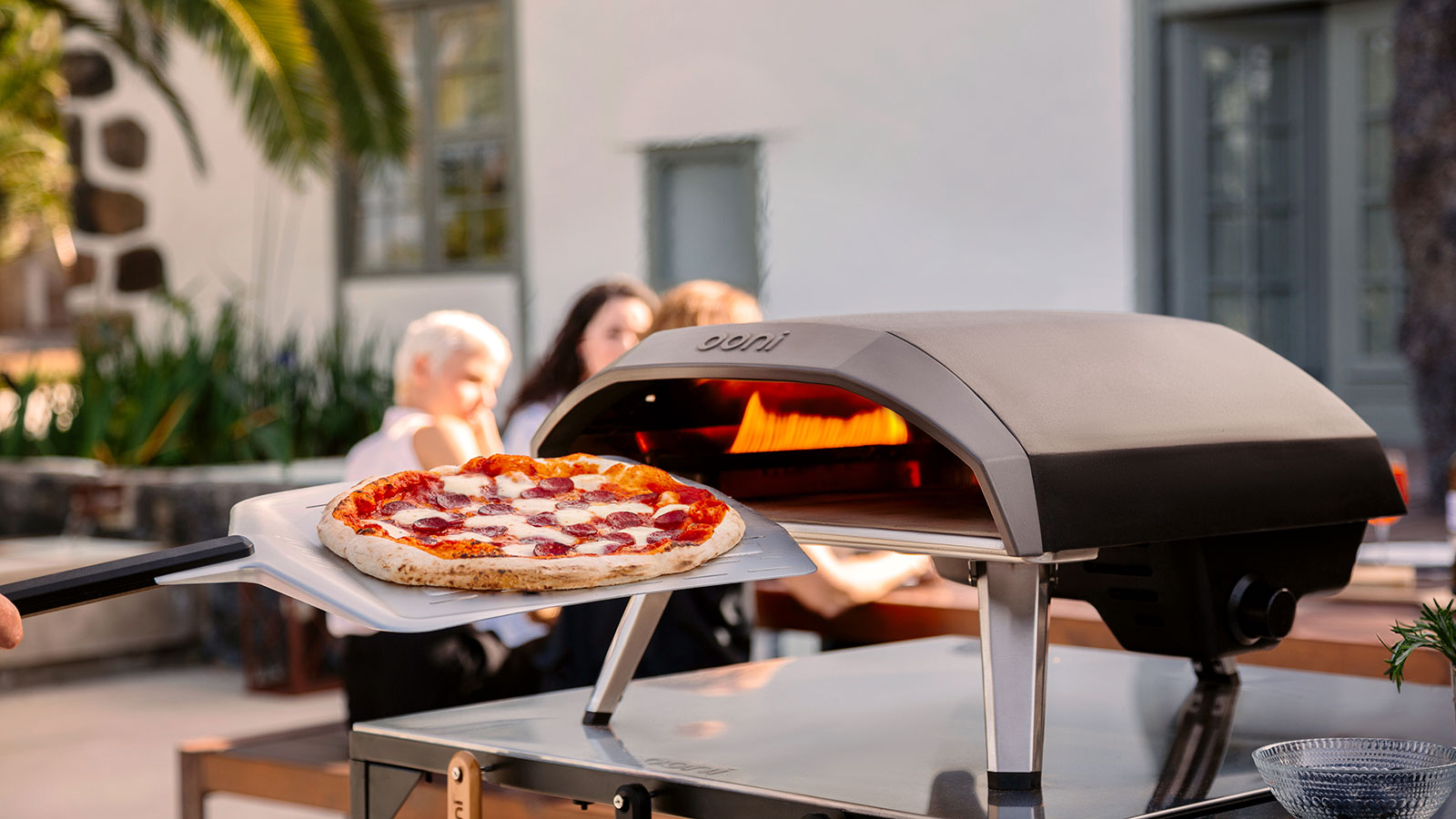

If you want to reproduce a traditional pizzeria taste at home, then a dedicated pizza oven is a must-have for the backyard. Once you’ve learned how to use it, authentic results with the taste and texture that are both vital to a quality pie can be yours.
The knowledge you need to make sure your pizzas are the real deal includes the details on timings, heat, pizza preparation and the cooking process. Get savvy about these factors and you can serve up delicious slices for friends and family with the toppings everyone loves and the perfect pizza crust.
Here, we’ve put together a guide to all the elements that go into using your pizza oven for mouth-watering results every time.
Expert advice for using a pizza oven
A pizza oven fueled by wood, wood pellets or gas can produce restaurant-level results in your own yard. The oven is designed to create the high heat required for a traditional speckled crust that’s crisp and delicious, and that melts cheese perfectly and produces wonderfully tasty toppings without leaving you and your guests hanging around.
But along with the best oven, knowhow on using it is crucial, and these are the essentials.
Heat up your pizza oven
For perfect pizza, it’s essential to allow adequate time after lighting a pizza oven for it to heat up properly. ‘Pizza ovens come in a wide variety of materials, sizes and shapes, all of which have a major impact on the speed – more so than the fuel type,’ says Davide Corsetti, export manager from Alfa Forni in Italy. ‘For example, a traditional brick oven might take up to two hours to reach the right temperature, whereas a modern stainless-steel oven like ours can get there in a matter of minutes.
‘No matter how different they are, all ovens have this in common: you must give the entire structure enough time to heat before you start cooking. Even if the required air temperature has been reached, the oven floor may not yet be hot enough to cook on, in which case your toppings will burn before your base is cooked. If you’re making a Neapolitan-style pizza, you need an oven temperature of 750 to 950˚F and a floor temperature of around 650˚F.’
Design expertise in your inbox – from inspiring decorating ideas and beautiful celebrity homes to practical gardening advice and shopping round-ups.
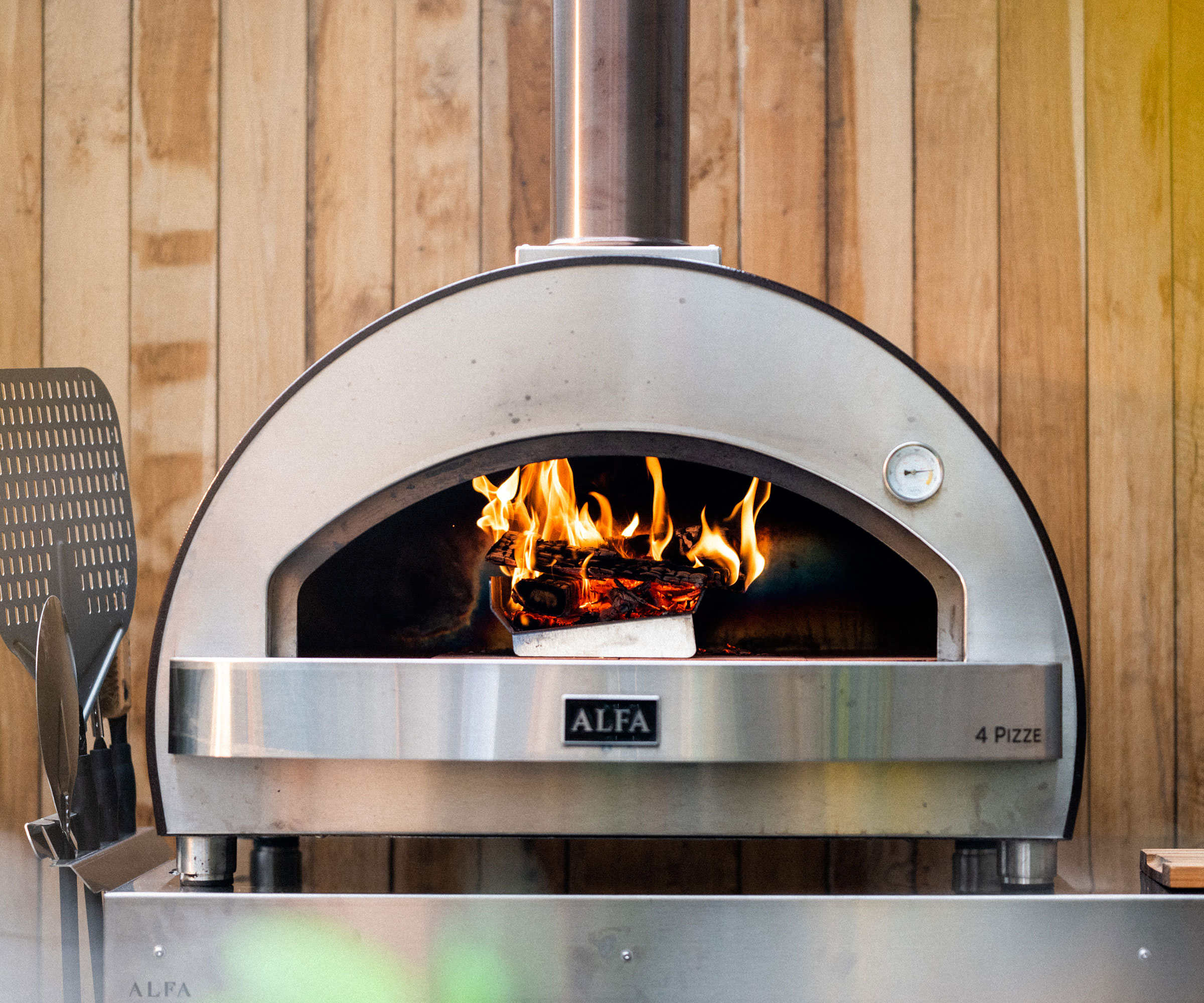
Pizza oven from Alfa Forni
Prepare the dough
For success with a pizza oven, prepare the ingredients in good time. ‘The best pizza dough is always made in advance, as it’s the fermentation that adds texture, gluten structure and flavor,’ says Davide. ‘You need to make it at least six to seven hours ahead, but some dough benefits from fermenting over a few days.
‘If your dough is resting in the fridge, take it out about one to two hours hours before you plan to cook. While the oven is heating, get organized: get your toppings and tools ready and give your work area a clean. Only once the oven is fully up to temperature and the floor of your outdoor kitchen has been swept of any ash or dust should you start to make your pizza. If you roll it too soon, there’s a chance your dough may stick to the surface while you’re waiting around.
‘Pizzaiolo pros build their pizza on the table, on a bed of flour and semolina. Then, in one confident swoosh, they slide the peel under the pizza, before shaping it into a perfect circle and launching it into the oven. If you don’t yet have the confidence to do that, it’s fine to build the pizza on the peel, but do make sure the peel has been dusted with a 50/50 flour-semolina mix first.’
Launch the pizza
There’s a technique you need to know when it comes to launching the pizza into the oven. ‘The flour and semolina are needed to prevent the pizza from sticking,’ says Davide Corsetti. ‘Give the peel a little wiggle back and forth to loosen it up before you launch – you only need the slightest of movements. The launch doesn’t necessarily need to be quick, but it does need to be assertive. Don’t hesitate!
‘Aim the tip of the peel just past the center of the oven, so that the pizza ends up sitting in the middle of the floor once you’ve snapped the peel out from beneath it.’
Some pizza peels, such as this lightweight peel from Ooni, come with a long handle to make it even easier to transfer your pizza from the oven to the plate. There's also a perforated peel from Ooni, which allows steam to quickly evaporate.
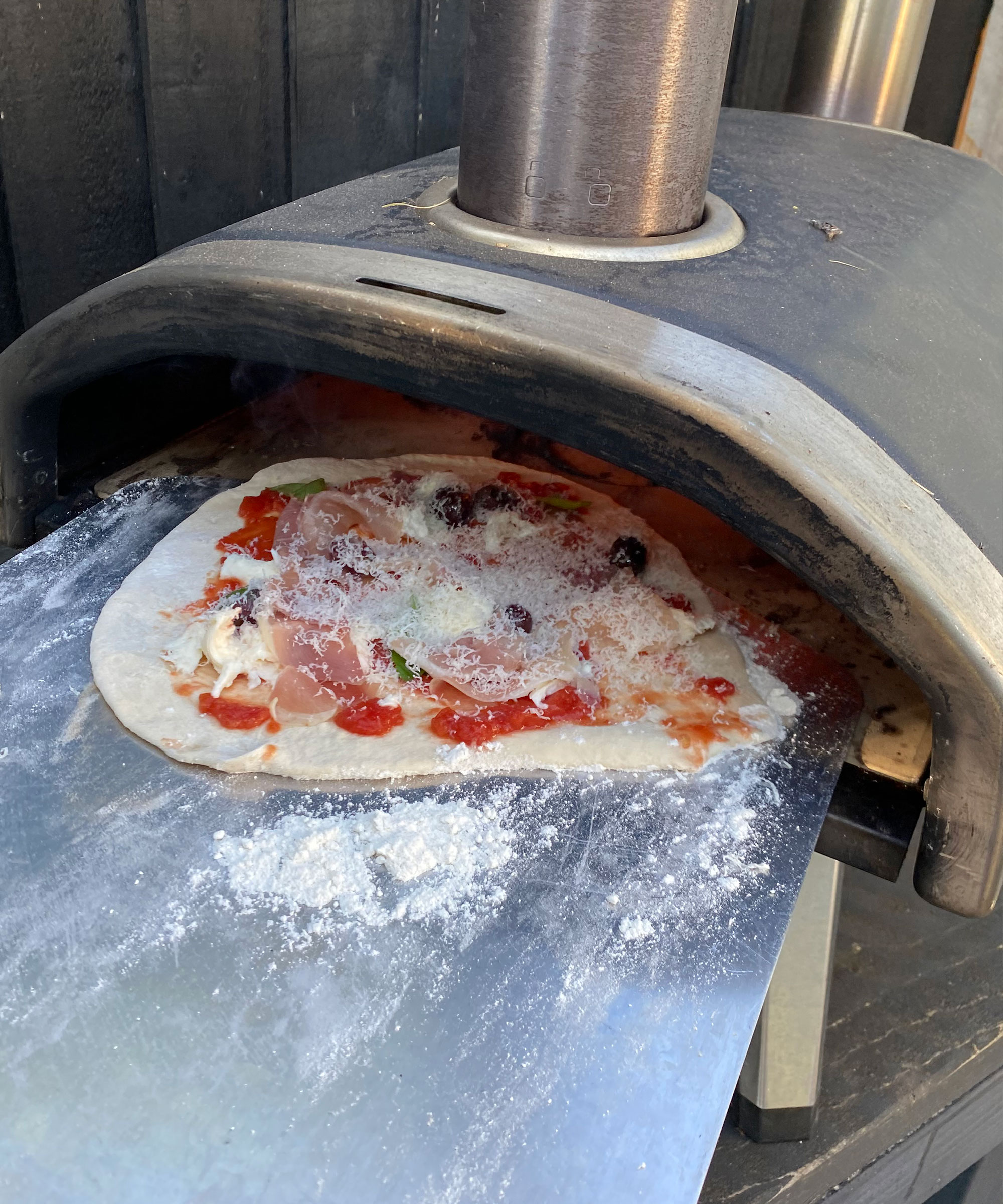
Once you've mastered the basic technique, sliding your pizza into the oven is easy
Consider cooking times
Cooking times aren’t dependent on the fuel your pizza oven uses. ‘It’s the temperature of the oven and the style of the pizza that matter,’ explains Davide. ‘A Neapolitan-style pizza will cook in about 90 seconds at 750 to 950˚F, while the thinner, crispier Roman style cooks for about five to six minutes at 680˚F.
‘The biggest impact from the fuel type is on how quickly you can turn out several rounds of pizza: with a wood-fired oven, you’ll occasionally need to add more fuel as the temperature starts to dip, whereas a gas oven can maintain a constant heat without further intervention.’
Tend the pizza
For excellent results you need to turn a pizza as it cooks. ‘Again, it depends on the temperature – if you’re cooking at a higher temperature you’ll need to turn it more often,’ says Davide. ‘A good rule of thumb for a 90 second Neapolitan pizza is that you turn it 45 degrees every 15 seconds. But keep your eyes on the pizza rather than the clock.’
'When cooking in my Ooni Fyra portable pizza oven, I find that turning our pizza once or twice during the 60-second cook is more than enough to achieve a good overall color, and it prevents any part of the pizza burning,' says Beth Murton, Head of Gardens at Homes & Gardens. 'It's important to be quick, however, as I don't want lots of heat escaping from the front of the oven when I remove the door to turn the pizza.'
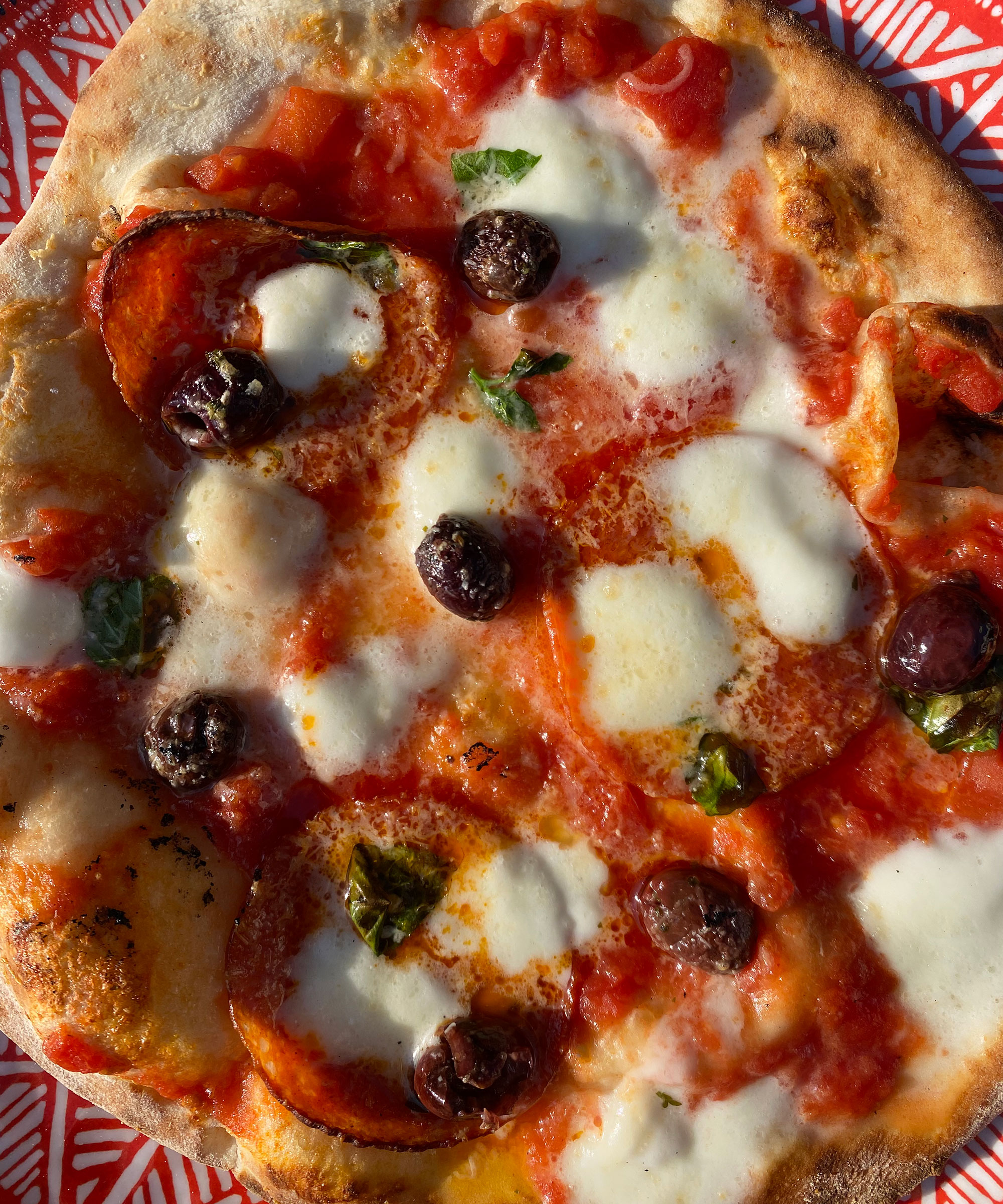
Turning your pizza during cooking ensures an even bake
Go beyond the obvious
A pizza oven can be a pretty expensive purchase for an appliance that can only cook one type of food. However, you can use them to cook a wide range of different breads, not just pizza. We've used them to make lots of different flatbreads, and they can add a delicious char to tortillas and naans.
They're also useful for more than just dough. The char-grill flavour that you get from wood-fired pizza ovens is perfect for Mexican cuisine. We've used a pizza oven to cook delicious chicken thighs and grilled vegetables that are perfect for fajitas. If you can grill it in an oven, you can grill it in a pizza oven (as you can see in our review of the Ooni Koda 12). There's really no limit on what you can cook as long as it fits in a flat skillet, such as Ooni's cast-iron skillet pan.
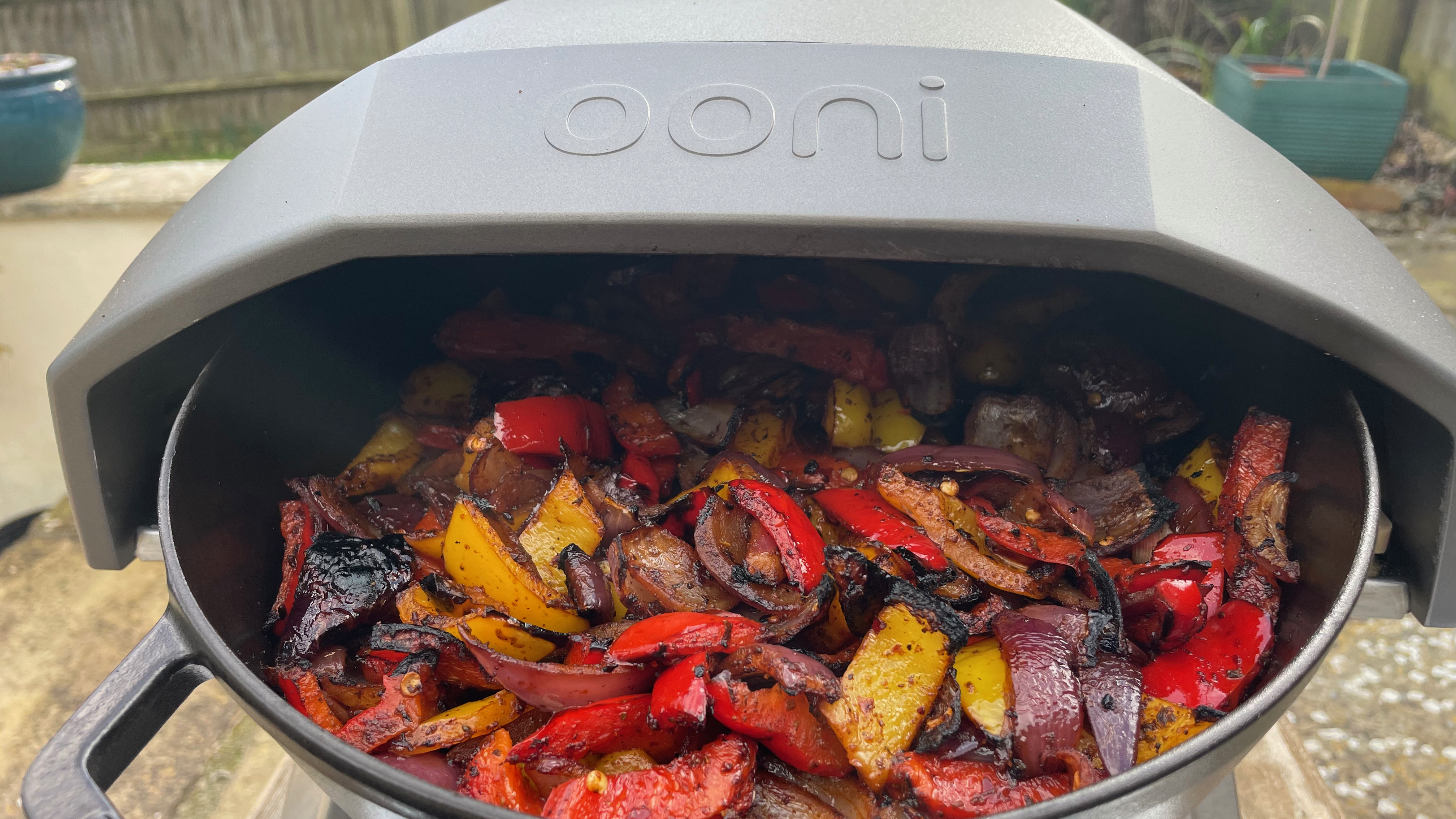
Testing roasted vegetables in the Ooni Koda 12
If you want to get the most from your new pizza oven, it's essential to get to grips with using it properly. Once you've mastered the basics of lighting it and maintaining a constant heat to cook a number of pizzas, you can get more adventurous and try a wider range of dishes.
You could even try using different types of wood in your pizza oven to add interesting flavors to your favorite pies.

Sarah is a freelance journalist and editor. Previously executive editor of Ideal Home, she’s specialized in interiors, property and gardens for over 20 years, and covers interior design, house design, gardens, and cleaning and organizing a home for Homes & Gardens. She’s written for websites, including Houzz, Channel 4’s flagship website, 4Homes, and Future’s T3; national newspapers, including The Guardian; and magazines including Future’s Country Homes & Interiors, Homebuilding & Renovating, Period Living, and Style at Home, as well as House Beautiful, Good Homes, Grand Designs, Homes & Antiques, LandLove and The English Home among others. It’s no big surprise that she likes to put what she writes about into practice, and is a serial house renovator.